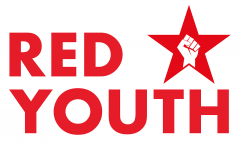A tribute to the great and much lamented freedom fighter, Nelson Rohilalal Mandela, written by our South African comrade Khwezie Kadalie, who played an active role in the armed struggle to overthrow Apartheid.
The dichotomy between overblown rhetoric about civil, political, economic, social and human rights, on the one hand, and the omnipresent income inequalities and the conditions of squalor which blight the lives of millions of black South Africans, on the other hand, is all too obvious. The sluggish response to the police massacre of 34 miners at Marikana was a brutal reminder of the gulf dividing the ANC leadership and the poorer sections of the population.
The glaring contrast in the lives of those who tweet on the best technology and those who do not have sufficient food to eat hardly needs pointing out. Wealth is still dominated by the white minority. According to a 2007 survey, white South Africans earn seven times as much as their black counterparts. A white person born in 2009 can expect to live to the age of 71, as against the 48 years that a black person can expect. It is a shameful statistic, but true, that inequality of income presently is worse than even during the decades of apartheid, with the second-worst Gini coefficient (a measure of inequality) among 136 countries.
The black masses of South Africa have achieved political freedom – doubtless an historic advance. They have, however, yet to achieve economic freedom. The power base of monopoly capital, local and foreign, as well as white economic privilege, is intact.
Lack of economic justice is a festering sore and a source of great frustration, anger and sheer hate bubbling just beneath the surface, without addressing which there will be no peace in South Africa. The next phase of the liberation struggle in South Africa is bound to tackle this question and usher in changes which will not be to the liking of the privileged minority.
Amidst the media frenzy following the death of Mandela, with one-sided saturation reporting and wall-to-wall coverage emphasising Mandela’s powers of reconciliation, the following thoughtful comment furnished a healthy antidote to the sickening extravaganza aimed at rewriting the history of the South African liberation struggle with the sole purpose of influencing the future course of its development to the advantage of imperialism and the local elites alike:
” As Mandela led South Africa through the peaceful transition to a ‘rainbow nation’ at the 1994 election, white support for him became near-universal, particularly among the young. But there is a negative side to this near-adulation: many still seem to think that after his journey from a prison cell to the presidency, no further change is required, and that the whites’ overwhelming economic privilege can be maintained.
“Whites often appeared to cling to Madiba, Mandela’s clan name as if to banish the thought of what might happen when he was gone. They are probably right to fear that without his forgiving presence, chillier winds may blow around them.
“South Africa has lost the greatest figure in its history, but Mandela’s death merely marks the end of the first phase in the country’s revolution. There is much change yet to come, and little of it will be palatable to those who imagine things can stay the same” (Raymond Whitaker, ‘Chillier winds may blow through the nation’, The Independent, 6 December 2013).
see also:
Mandela and His Legacy
http://www.lalkar.org/issues/contents/jan2014/mandela.html
Nelson Mandela: A life of hard and heroic struggle in the service of the masses
http://www.lalkar.org/issues/contents/jan2014/mandelastruggle.html
Apartheid
http://www.lalkar.org/issues/contents/jan2014/mandelaapartheid.html
http://www.cpgb-ml.org
http://www.youtube.com/ProletarianCPGBML
Red Youth Education Program: Each one teach one!
http://redyouthuk.wordpress.com/educational-links/
Join the struggle!
http://www.cpgb-ml.org/index.php?secName=join
Donate:
https://www.paypal.com/cgi-bin/webscr?cmd=_s-xclick&hosted_button_id=RNTPLUHGTMRP6



